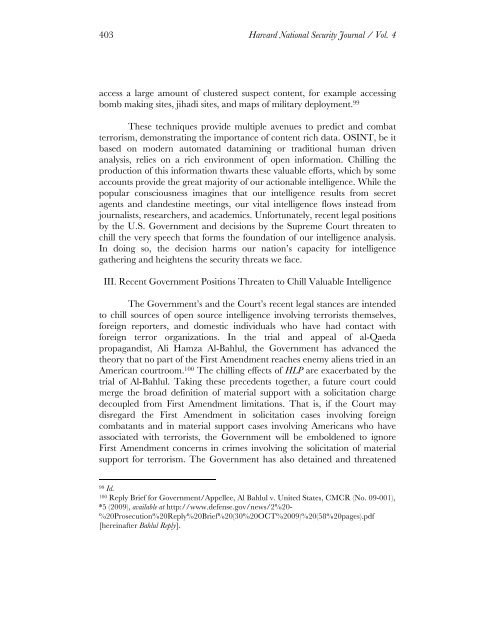Vo.4-Moshirnia-Final
Vo.4-Moshirnia-Final
Vo.4-Moshirnia-Final
Create successful ePaper yourself
Turn your PDF publications into a flip-book with our unique Google optimized e-Paper software.
403 Harvard National Security Journal / Vol. 4<br />
access a large amount of clustered suspect content, for example accessing<br />
bomb making sites, jihadi sites, and maps of military deployment. 99<br />
These techniques provide multiple avenues to predict and combat<br />
terrorism, demonstrating the importance of content rich data. OSINT, be it<br />
based on modern automated datamining or traditional human driven<br />
analysis, relies on a rich environment of open information. Chilling the<br />
production of this information thwarts these valuable efforts, which by some<br />
accounts provide the great majority of our actionable intelligence. While the<br />
popular consciousness imagines that our intelligence results from secret<br />
agents and clandestine meetings, our vital intelligence flows instead from<br />
journalists, researchers, and academics. Unfortunately, recent legal positions<br />
by the U.S. Government and decisions by the Supreme Court threaten to<br />
chill the very speech that forms the foundation of our intelligence analysis.<br />
In doing so, the decision harms our nation’s capacity for intelligence<br />
gathering and heightens the security threats we face.<br />
III. Recent Government Positions Threaten to Chill Valuable Intelligence<br />
The Government’s and the Court’s recent legal stances are intended<br />
to chill sources of open source intelligence involving terrorists themselves,<br />
foreign reporters, and domestic individuals who have had contact with<br />
foreign terror organizations. In the trial and appeal of al-Qaeda<br />
propagandist, Ali Hamza Al-Bahlul, the Government has advanced the<br />
theory that no part of the First Amendment reaches enemy aliens tried in an<br />
American courtroom. 100 The chilling effects of HLP are exacerbated by the<br />
trial of Al-Bahlul. Taking these precedents together, a future court could<br />
merge the broad definition of material support with a solicitation charge<br />
decoupled from First Amendment limitations. That is, if the Court may<br />
disregard the First Amendment in solicitation cases involving foreign<br />
combatants and in material support cases involving Americans who have<br />
associated with terrorists, the Government will be emboldened to ignore<br />
First Amendment concerns in crimes involving the solicitation of material<br />
support for terrorism. The Government has also detained and threatened<br />
99 Id.<br />
100 Reply Brief for Government/Appellee, Al Bahlul v. United States, CMCR (No. 09-001),<br />
*5 (2009), available at http://www.defense.gov/news/2%20-<br />
%20Prosecution%20Reply%20Brief%20(30%20OCT%2009)%20(58%20pages).pdf<br />
[hereinafter Bahlul Reply].
















